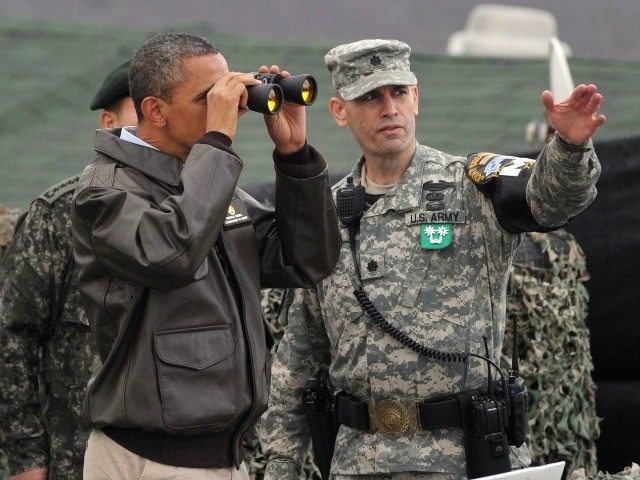U.S. troops in Afghanistan will remain vigilante on Christmas Day against an insurgent threat that “persists” even after the United States ended its 13-year combat mission there, an American soldier told Breitbart News.
“Christmas is a special holiday for our U.S. troops and international partners,” U.S. Air Force Capt. Frank Hartnett, a spokesman for NATO’s International Security Assistance Force (ISAF) headquarters in Kabul, Afghanistan, told Breitbart News.
On Christmas Day, “troops will work reduced hours if possible. We always keep our guard over here since the threat persists,” he added. “But many troops over here are looking forward to phone calls and video chatting over the Internet.”
In particular, Afghanistan, the capital of Kabul, experienced a surge in Taliban attacks this year, resulting in dozens of fatalities, including two American soldiers who were killed after the U.S. ended its combat operations on December 8.
The Afghan National Security Force (ANSF), which includes the national army and police, bore the brunt of the attacks, as it is in the lead of Afghanistan’s security.
According to official figures obtained by The New York Times, “Afghanistan has lost more than 5,000 police and soldiers in the fighting this year, more than any previous year.” That is more than double the 2,213 U.S. soldiers who have been killed since the conflict started on October 7, 2001.
On Christmas Eve, British and German ISAF units celebrated by reenacting a friendly soccer match to observe the 100th anniversary of the Christmas Truce during WWI, when troops from Germany and Britain temporarily stopped fighting, mingled, and played a game of soccer instead, keeping the spirit of the holidays alive in the darkness of conflict.
“It was a wonderful reminder that the holidays can bring out the best in people, even during desperate times,” Capt. Hartnett told Breitbart News.
The United States ceremoniously ended its combat operations in Afghanistan on December 8, marking one of the final steps in the transition to the train and assist mission expected to start at the beginning of 2015.
About 10,800 U.S. soldiers will be in Afghanistan at the beginning of next year, which is 1,000 more than originally planned. Those soldiers will still have the authority to conduct narrower counterterrorism operations against al-Qaeda and other jihadists threatening the United States and its allies.
Except for a small residual force charged with securing the U.S. embassy, all American forces are expected to be out of Afghanistan by the end of 2016.
In a joint-message to the troops, published on Christmas Day, U.S. Gen. John Campbell, the top commander of American and NATO troops, and U.S. Command Sgt. Maj. Delbert Byers, the senior enlisted leader of ISAF, praised a “highly capable” Afghan force and coalition troops for their sacrifice.
“Perhaps the greatest Christmas gift we can continue to bestow upon our countries and loved ones is the gift of security,” the military leaders said. They added, “Because of your extraordinary efforts, courage, and vigilance, our fellow citizens will pass the holidays free from fear of another terrorist attack emanating from Afghanistan.” Putting things into perspective, the leaders stated, “We hope you will take solace and pride in this fact as we endure the separation from our families who unfailingly support us.”
The military leaders asked troops to pause for a moment and reflect on the fallen and their loved ones.
“We can best honor their memory by redoubling our efforts to bring peace and harmony to this war-torn land. Our continued resilience and resolve will ensure that our hard-earned gains are enduring,” continued the message.
Coalition troops and the ANSF have created security conditions that have “lifted the Afghan people out of the darkness of despair and given them hope for the future.”
Earlier this month, the special inspector general for Afghanistan Reconstruction reported that Afghanistan will likely be incapable of fiscally sustaining the Afghan forces after 2014.

COMMENTS
Please let us know if you're having issues with commenting.